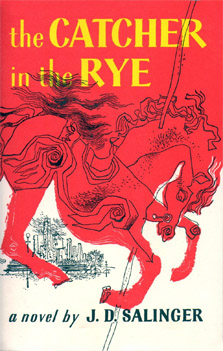
On July 16, 1951, J.D. Salinger published a book that just about everyone (in this country, at least) has had to read at one point or another: The Catcher in the Rye. Some people love it, and some people (maybe more people) love to hate it—but others, myself included, just shrug and say, “Yeah, it was alright.”
This is actually something of a source of contention in my house. My fiancée hates Holden Caulfield with a vigorous passion; after all, he’s whiney and spends 200+ pages doing, well, basically nothing. I, on the other hand, think the book actually has some merits (and if I ever want to lose my fiancée, all I have to do is expound upon some of those merits aloud).
So it’s at great risk to my personal life (and possibly my blog followership) that I expound upon them here, if only silently:
What I think causes some people to write the book off is the assumption that Holden is troubled (i.e., whiney and self-centered) simply because he’s an adolescent—and therefore the book can only be enjoyed by other whiney, self-centered adolescents who can commiserate. But I’d argue the book is less about coming of age and more about coping with loss—and Holden is troubled not just because he’s a stupid teenager, but because he suffers guilt and self-inflicted alienation as he deals with the death of his brother, Allie. (In 1951, just after World War 2, I think there were probably a few other American teenagers who could sympathize.)
Showing us Holden’s journey from expulsion, to an encounter with a prostitute in a run-down motel, to the museum of natural history and back home again, Salinger paints a superficially light but ultimately sad picture of a boy trying desperately to recapture the past while his life in the present falls apart around him. Far from being a knock against the book, I think Holden’s failure to change substantially is actually the whole point.
Apart from this, the book is also a fairly biting commentary on adult life, a decent trove of symbolism and imagery, and even laugh-out-loud funny in spots. And let’s not forget, it contains one of the most memorable and recognizable voices in literary history.
Don’t get me wrong: It’s not my favorite book, but I also don’t think it’s the fetid fecal effluvium that some like to claim. (Translation: It’s not a total turd).
Gross. Anyway, enough of what I think—what camp do you fall into? Are you a Holden Hater, a Salinger Supporter, or something in between?
When I finished that book, I spent some time wondering why it was even written. I suppose it’s a bit like reading Hesse as a teen and being awestruck and later revisiting him as an adult and being limited to a smile.
I read the book for school and never understood what the big deal was. As soon as classes finished on it, I put it in my bookshelf, not ever thinking about it again before this post. I’m definitely in the “Meh, NEXT!” category.